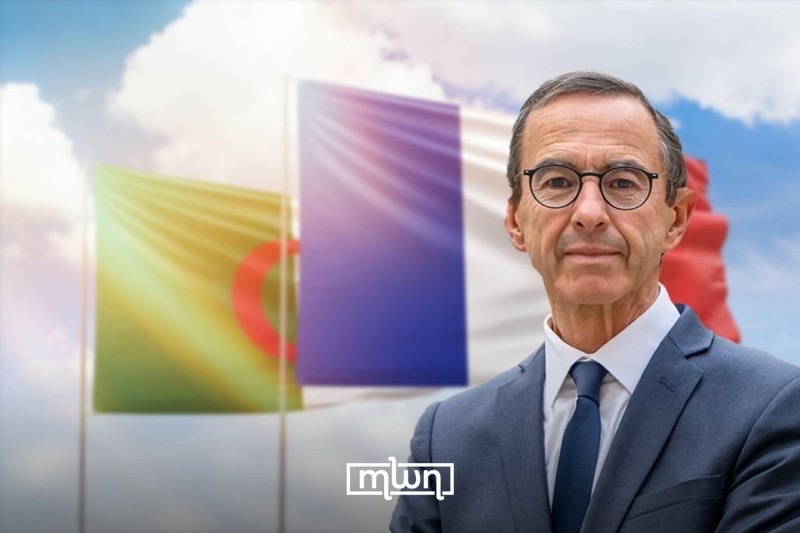Doha - France’s Interior Minister Bruno Retailleau has called for the termination of the controversial 1968 Franco-Algerian agreement, citing Algeria’s recent “diplomatic offenses” and what he termed as the country’s failure to respect international law.
“This agreement is outdated and has distorted Algerian immigration. It has no reason to exist. We must put it back on the table,” Retailleau declared Sunday on BFMTV, following Algeria’s refusal to accept an expelled Algerian influencer who held a biometric passport.
“Algeria has not respected international law,” he asserted, adding that “France must choose means to respond to Algeria... I am in favor of strong measures because without a show of force, we won't succeed.”
The Interior Minister further escalated his rhetoric, stating that “France has done everything it could on the path to reconciliation, and in return, we have only received acts of aggression.”
He said that “French pride has been wounded by the offense that Algeria has made to France,” and insisted that Algeria “cannot offend France with impunity.”
Retailleau suggested that “a number of measures, such as ending the 1968 agreement, must be considered.”
The 1968 bilateral agreement, which supersedes French common law on immigration matters, creates a unique status for Algerian nationals regarding movement, residence, and employment in France.
Under these provisions, Algerians enjoy simplified entry procedures without requiring long-stay visas and can more readily establish businesses or pursue independent professions.
They also benefit from accelerated access to 10-year residence permits compared to other nationalities.
Official data from the French Interior Ministry shows the agreement’s impact: Algeria leads in residence permit allocations, with 646,462 permits granted to Algerian nationals in 2023, significantly outpacing other countries.
The push to end the agreement comes amid escalating tensions between Paris and Algiers. This was recently exacerbated by the imprisonment of Franco-Algerian writer Boualem Sansal and deteriorating diplomatic relations since France’s support for Morocco’s Western Sahara Autonomy Plan last summer.
While former Prime Minister Dominique de Villepin cautioned against this confrontational approach, calling it “escalation” and “one-upmanship,” the current administration appears divided.
Foreign Minister Jean-Noël Barrot maintains a more diplomatic stance, stating that “it’s not a miracle solution to suppress or abrogate it. If it were, we would have known it long ago.”
However, any modification to the agreement ultimately requires President Emmanuel Macron’s approval, who has consistently resisted calls for its termination despite pressure from various political figures, including former Prime Minister Édouard Philippe and a parliamentary resolution submitted by the right-wing in winter 2023.
Analysts suggest that Algeria might retaliate by significantly reducing the number of consular passes required for France to expel individuals under deportation orders.
Furthermore, the potential economic implications loom large, as Franco-Algerian trade saw substantial growth in 2023, particularly in hydrocarbon exports, which increased by 15% amid efforts to reduce French dependence on Russian gas.
The debate over the 1968 agreement has intensified in recent weeks, laying bare the dense network of historical, diplomatic, and economic interests that interlock the two countries, even as relations reach their most strained point in two decades.
“This agreement is outdated and has distorted Algerian immigration. It has no reason to exist. We must put it back on the table,” Retailleau declared Sunday on BFMTV, following Algeria’s refusal to accept an expelled Algerian influencer who held a biometric passport.
“Algeria has not respected international law,” he asserted, adding that “France must choose means to respond to Algeria... I am in favor of strong measures because without a show of force, we won't succeed.”
The Interior Minister further escalated his rhetoric, stating that “France has done everything it could on the path to reconciliation, and in return, we have only received acts of aggression.”
He said that “French pride has been wounded by the offense that Algeria has made to France,” and insisted that Algeria “cannot offend France with impunity.”
Retailleau suggested that “a number of measures, such as ending the 1968 agreement, must be considered.”
The 1968 bilateral agreement, which supersedes French common law on immigration matters, creates a unique status for Algerian nationals regarding movement, residence, and employment in France.
Under these provisions, Algerians enjoy simplified entry procedures without requiring long-stay visas and can more readily establish businesses or pursue independent professions.
They also benefit from accelerated access to 10-year residence permits compared to other nationalities.
Official data from the French Interior Ministry shows the agreement’s impact: Algeria leads in residence permit allocations, with 646,462 permits granted to Algerian nationals in 2023, significantly outpacing other countries.
The push to end the agreement comes amid escalating tensions between Paris and Algiers. This was recently exacerbated by the imprisonment of Franco-Algerian writer Boualem Sansal and deteriorating diplomatic relations since France’s support for Morocco’s Western Sahara Autonomy Plan last summer.
While former Prime Minister Dominique de Villepin cautioned against this confrontational approach, calling it “escalation” and “one-upmanship,” the current administration appears divided.
Foreign Minister Jean-Noël Barrot maintains a more diplomatic stance, stating that “it’s not a miracle solution to suppress or abrogate it. If it were, we would have known it long ago.”
However, any modification to the agreement ultimately requires President Emmanuel Macron’s approval, who has consistently resisted calls for its termination despite pressure from various political figures, including former Prime Minister Édouard Philippe and a parliamentary resolution submitted by the right-wing in winter 2023.
Analysts suggest that Algeria might retaliate by significantly reducing the number of consular passes required for France to expel individuals under deportation orders.
Furthermore, the potential economic implications loom large, as Franco-Algerian trade saw substantial growth in 2023, particularly in hydrocarbon exports, which increased by 15% amid efforts to reduce French dependence on Russian gas.
The debate over the 1968 agreement has intensified in recent weeks, laying bare the dense network of historical, diplomatic, and economic interests that interlock the two countries, even as relations reach their most strained point in two decades.

